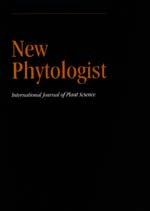Crossref Citations
This article has been cited by the following publications. This list is generated based on data provided by
Crossref.
Ozinga, Wim A.
Andel, Jelte Van
and
McDonnell-Alexander, Michael P.
1997.
Nutritional soil heterogeneity and mycorrhiza as determinants of plant species diversity.
Acta Botanica Neerlandica,
Vol. 46,
Issue. 3,
p.
237.
Frazer, Lilyann Novak
1998.
One stop mycology.
Mycological Research,
Vol. 102,
Issue. 1,
p.
103.
Chambers, S. M.
and
Cairney, J. W. G.
1999.
Ectomycorrhizal Fungi Key Genera in Profile.
p.
1.
Bianciotto, V.
and
Bonfante, P.
1999.
Mycorrhiza.
p.
229.
Balestrini, Raffaella
Perotto, Silvia
Gasverde, Elena
Dahiya, Preeti
Guldmann, Lise-Lotte
Brewin, Nicholas J.
and
Bonfante, Paola
1999.
Transcription of a Gene Encoding a Lectinlike Glycoprotein Is Induced in Root Cells Harboring Arbuscular Mycorrhizal Fungi in Pisum sativum.
Molecular Plant-Microbe Interactions®,
Vol. 12,
Issue. 9,
p.
785.
Varma, A.
1999.
Mycorrhiza.
p.
521.
Varma, A.
1999.
Mycorrhiza.
p.
373.
Martino, Elena
Turnau, Katarzyna
Girlanda, Mariangela
Bonfante, Paola
and
Perotto, Silvia
2000.
Ericoid mycorrhizal fungi from heavy metal polluted soils: their identification and growth in the presence of zinc ions.
Mycological Research,
Vol. 104,
Issue. 3,
p.
338.
Bergero, R.
Perotto, S.
Girlanda, M.
Vidano, G.
and
Luppi, A. M.
2000.
Ericoid mycorrhizal fungi are common root associates of a Mediterranean ectomycorrhizal plant (Quercus ilex).
Molecular Ecology,
Vol. 9,
Issue. 10,
p.
1639.
Perotto, Silvia
Nepote-Fus, Paola
Saletta, Laura
Bandi, Claudio
and
Young, J. Peter W.
2000.
A Diverse Population of Introns in the Nuclear Ribosomal Genes of Ericoid Mycorrhizal Fungi Includes Elements with Sequence Similarity to Endonuclease-Coding Genes.
Molecular Biology and Evolution,
Vol. 17,
Issue. 1,
p.
44.
Martino, Elena
Coisson, Jean Daniel
Lacourt, Isabelle
Favaron, Francesco
Bonfante, Paola
and
Perotto, Silvia
2000.
Influence of heavy metals on production and activity of pectinolytic enzymes in ericoid mycorrhizal fungi.
Mycological Research,
Vol. 104,
Issue. 7,
p.
825.
Briggs, C. L.
and
Ashford, A. E.
2001.
Structure and composition of the thick wall in hair root epidermal cells of Woollsia pungens.
New Phytologist,
Vol. 149,
Issue. 2,
p.
219.
Varma, A.
Singh, A.
Sudha
Sahay, N. S.
Sharma, J.
Roy, A.
Kumari, M.
Rana, D.
Thakran, S.
Deka, D.
Bharti, K.
Hurek, T.
Blechert, O.
Rexer, K.-H.
Kost, G.
Hahn, A.
Maier, W.
Walter, M.
Strack, D.
and
Kranner, I.
2001.
Fungal Associations.
p.
125.
Perotto, Silvia
Girlanda, Mariangela
and
Martino, Elena
2002.
Diversity and Integration in Mycorrhizas.
p.
41.
Singh, Geeta
and
Mukerji, K. G.
2002.
Techniques in Mycorrhizal Studies.
p.
365.
Read, D. J.
and
Perez‐Moreno, J.
2003.
Mycorrhizas and nutrient cycling in ecosystems – a journey towards relevance?.
New Phytologist,
Vol. 157,
Issue. 3,
p.
475.
Read, David J
Leake, Jonathan R
and
Perez-Moreno, Jesus
2004.
Mycorrhizal fungi as drivers of ecosystem processes in heathland and boreal forest biomes.
Canadian Journal of Botany,
Vol. 82,
Issue. 8,
p.
1243.
Midgley, David J.
Chambers, Susan M.
and
Cairney, John W. G.
2004.
Utilisation of carbon substrates by multiple genotypes of ericoid mycorrhizal fungal endophytes from eastern Australian Ericaceae.
Mycorrhiza,
Vol. 14,
Issue. 4,
p.
245.
Balestrini, R.
Cosgrove, D. J.
and
Bonfante, P.
2005.
Differential location of ?-expansin proteins during the accommodation of root cells to an arbuscular mycorrhizal fungus.
Planta,
Vol. 220,
Issue. 6,
p.
889.
Grelet, Gwen-Aëlle
Meharg, Andrew A.
and
Alexander, Ian J.
2005.
Carbon availability affects nitrogen source utilisation by Hymenoscyphus ericae.
Mycological Research,
Vol. 109,
Issue. 4,
p.
469.


